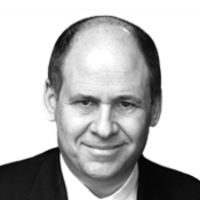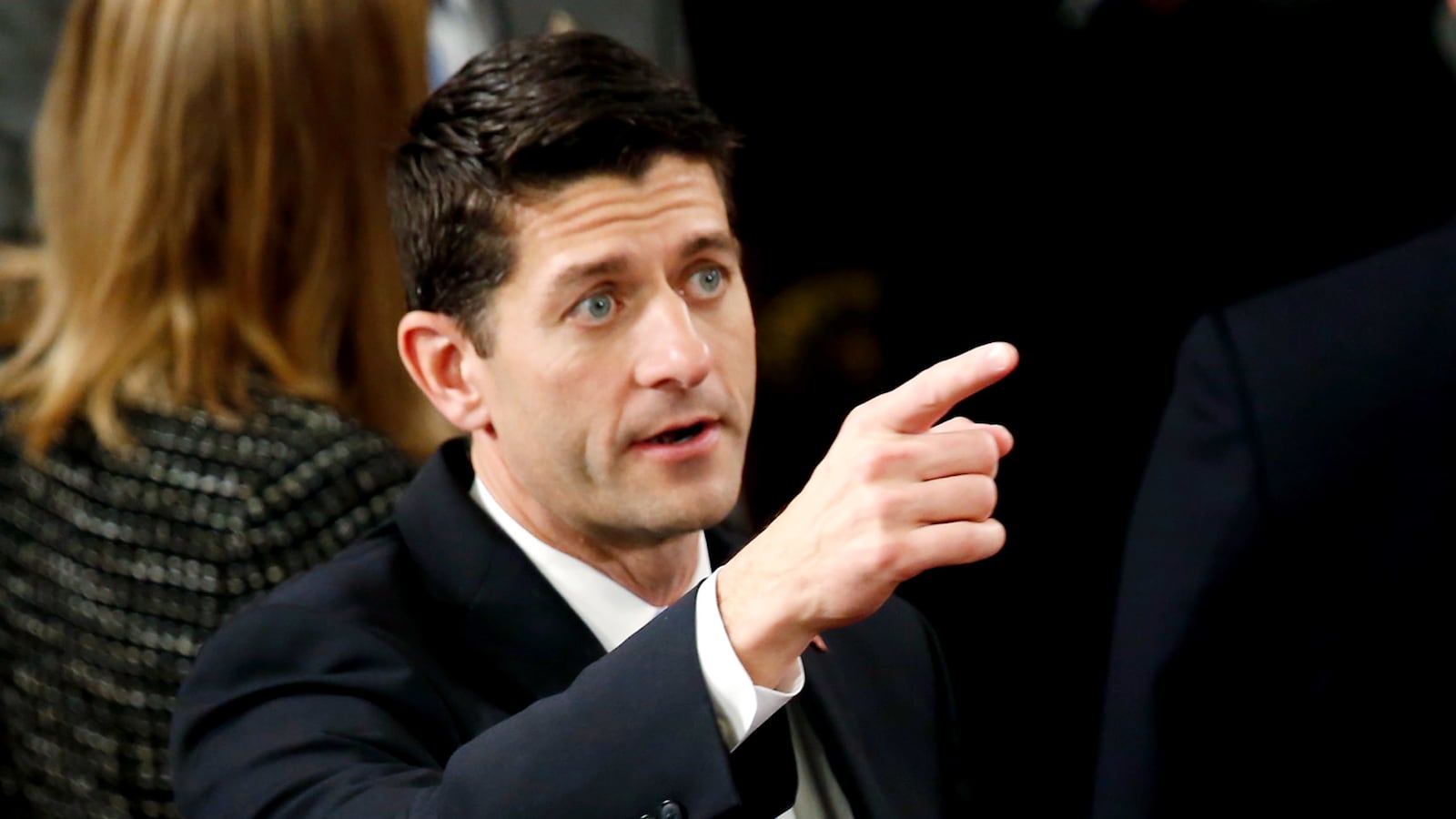Rep. Paul Ryan, the former vice-presidential candidate and new speaker of the House, is smart, pleasant, and willing to compromise—a “good guy, a decent guy,” as Vice President Joe Biden said on 60 Minutes last Sunday.
Ryan’s shrewd maneuvering since John Boehner announced his retirement will likely make him a powerful speaker. By conveying sincerity and civic virtue in his role as the reluctant Cincinnatus, he will take the gavel without having to promise much to the Freedom Caucus, headed by Rep. Jim Jordan, who showed what a nasty piece of work he is during the Benghazi hearings.
These wingnuts think Ryan is too liberal, which is as if a bunch of Democratic socialists in Congress—they don’t exist, of course—argued that Bernie Sanders was too conservative. They want Ryan to cede some of the speaker’s power to them and promise that their campaigns will get donations from the Republican Party even if they spend their time trashing him, as they did Boehner. Not gonna happen.
More immediately, Ryan is a grown-up with the good sense not to push the country into default. He supports using the “leverage” of a government shutdown to win spending cuts, but he also knows this hostage-taking usually ends badly for Republicans. In December of 2013, he cut a pragmatic deal with Democratic Sen. Patty Murray of Washington that eliminated some of the inanities of the so-called budget sequester and lowered the deficit by $23 billion.
More compromises could lie ahead. Ryan is stepping down as chairman of the House Ways and Means Committee, where he was working on tax reform, so it’s a good bet he’ll push forward on a big tax bill as speaker. In the best scenario, this would mean progress on a deal to fund the infrastructure projects the country desperately needs by taxing overseas earnings by U.S. corporations that have been avoiding taxes.
But as Washington breathes a sigh of relief over Ryan’s ascension, moderates should beware: This guy is not one of you. From his earliest days in politics, Ryan has been not just conservative but radical. The budgets he wrote in recent years as chairman of the House Budget Committee envision turning back the clock 80 years to a pre-New Deal America, with a sharply different social contract and a harsh attitude toward Americans unable to take care of themselves.
In Washington, compromise usually means splitting the difference—moving halfway from one’s initial position in the interest of getting something done. With Ryan, this would mean compromising between the far right and the moderate left, which leaves the country shifting significantly rightward.
President Obama is perfectly aware of this, which means that more vetoes and gridlock likely lie ahead. But Ryan’s camera-ready credibility with reporters (few of whom seem to have read his budget proposals) could mean stealthy gains on the right for as long as he is speaker. Boehner is conservative, but often indifferent to the policy details; Ryan, for all his affability, is a hardcore libertarian ideologue committed to voucherizing Medicare, throwing millions off Medicaid, and slashing discretionary spending on children’s health care, education, and food safety, among scores of other programs that in many cases would have to be cut by 75 percent or more to meet his targets.
Ryan’s more moderate supporters like to say that he has mellowed since his draconian 2012 budget, which was aimed less at deficit reduction (it didn’t balance the budget for 28 years) than at punishing poorer Americans he believed were relaxing in “hammocks” and slashing taxes for the top 1 percent. But his 2014 budget wasn’t much better. It proposed cutting spending by more than $500 billion a year over 10 years, which would mean eviscerating or eliminating things the federal government has done for decades, starting with food stamps and Pell grants.
Ryan came up as a protégé of the late Rep. Jack Kemp and recently hired a Kemp veteran as his chief of staff. But Kemp matched his support for tax cuts with genuine compassion for the less fortunate. So far, Ryan has shown none of that.
What he has shown is consistent political cunning. When he first ran for the House in 1998, he had worked for his family-owned construction firm, Ryan Inc., for just one year, but he donned a hard hat in TV ads to make it seem as if he was an experienced builder. He was single at the time but posed in the ads with his sister and infant niece to suggest he was a family man. Ever since, in contrast to so many of his colleagues, he has charmed most everyone he has come into contact with.
Ryan is a longtime disciple of Ayn Rand, the libertarian novelist who believed the poor are entirely at fault for their plight and deserve not a penny from the government. While many Rand fans give her up after adolescence, Ryan went the other direction. On the 100th anniversary of Rand’s birth in 2005, he gave a speech saying that her novel Atlas Shrugged “inspired me so much that it is required reading in my office for all my interns and staff.” Rand, he said, was the single most important influence in motivating him to get into public service and he explained in detail how she was “consistently undergirding” his actions in Congress: “I always go back to, you know, Francisco d’Anconia’s speech on money when I think about monetary policy. And then I go to the 64-page John Galt speech, you know, on the radio at the end.”
Ryan, a Catholic, did not follow Rand’s atheism. But he has kept faith with her on economics. In 2005, he was President Bush’s floor manager in his ill-fated effort to privatize Social Security. In 2010, during the Great Recession, he said the Federal Reserve should raise interest rates to forestall inflation, though there was none at the time and none on the horizon. He was a member of the Simpson-Bowles Commission but couldn’t support their reforms of entitlements because the large cuts the commission recommended weren’t large enough.
More recently, he said the Affordable Care Act has caused a “poverty trap” that discourages poor families from working. The truth in most cases is the exact opposite. Obamacare lets people seek higher-paying jobs without the risk of losing their Medicaid benefits, thereby incentivizing work. His plan to bloc-grant Medicaid (that is, turn it all over to the states) would mean a one-third reduction in benefits, thereby throwing several million people off health insurance.
Ryan has been explicit about repealing the New Deal. “It is so rare in American politics to arrive at a moment when the debate revolves around the fundamental nature of American democracy and the social contract, but that is exactly where we are today,” he said in 2012, the year he ran for vice president with Mitt Romney.
Since then, Ryan is showing signs of at least reassessing his rhetoric, if not his positions. In a 2014 memoir, The Way Forward, he expresses regret over his argument that 60 percent (more than Romney’s 47 percent) of Americans are “takers.” After listening to a Democratic speaker lay into him at a Wisconsin county fair, he thought to himself: “Who is a taker? My mom, who is on Medicare? Me at 18-years-old, using the Social Security survivor’s benefits we got after my father’s death to go to college? My buddy John Ramsdell, who had been unemployed and used job training to get back on his feet?.. That guy taught me a valuable lesson that day…The phrase I’d been using implied a certain judgment about the group that received government benefits—one that is in deep conflict with the American idea.”
This is an astonishing anecdote. Fifteen years after arriving in Congress it occurs to him that maybe he’s been a bit of a hypocrite in trashing programs his family has benefitted from. He realizes that maybe the libertarian doctrine he imbibed isn’t much of an answer to the problems of the modern world.
I guess it’s possible that he has learned something and will step back from radicalism to work harmoniously with Democrats, but only someone ignorant of the Ryan record would bet on it.
Updated 10:45 a.m. Oct. 29 to add his being elected to Speaker of the House.






